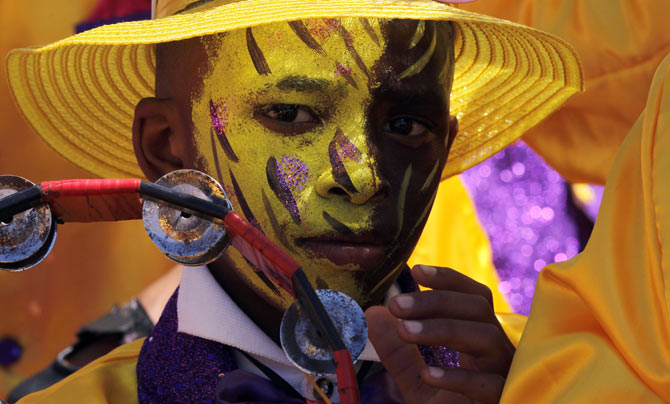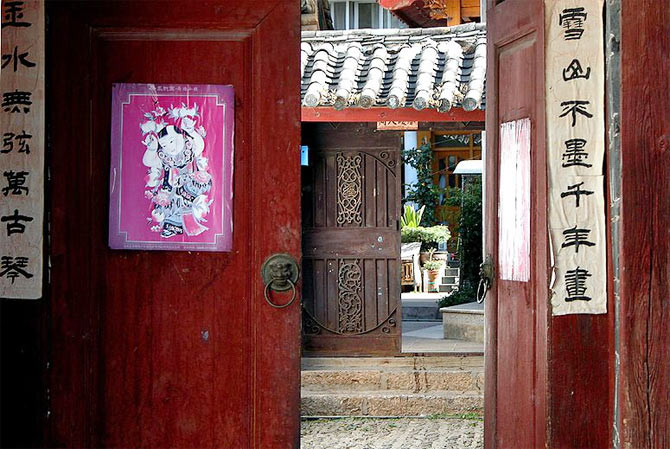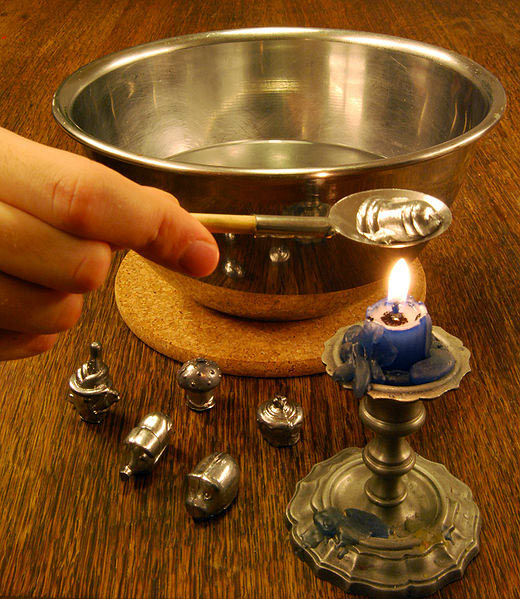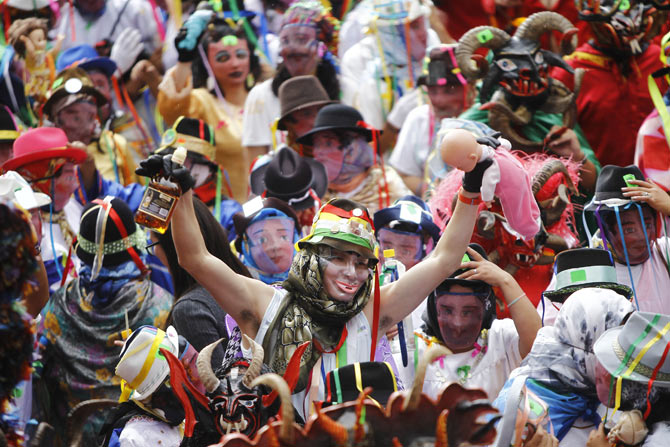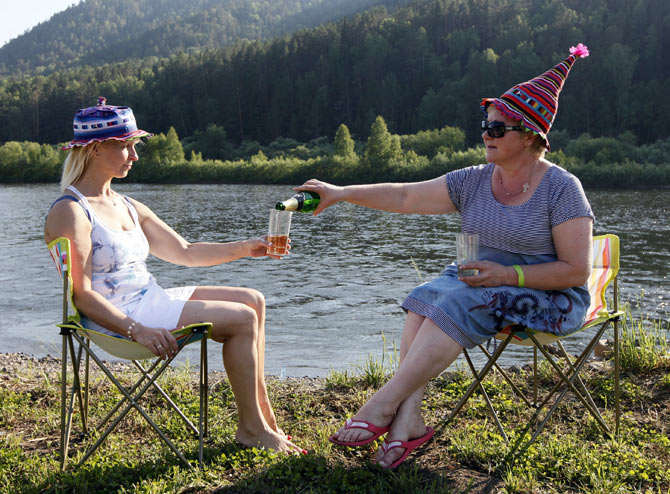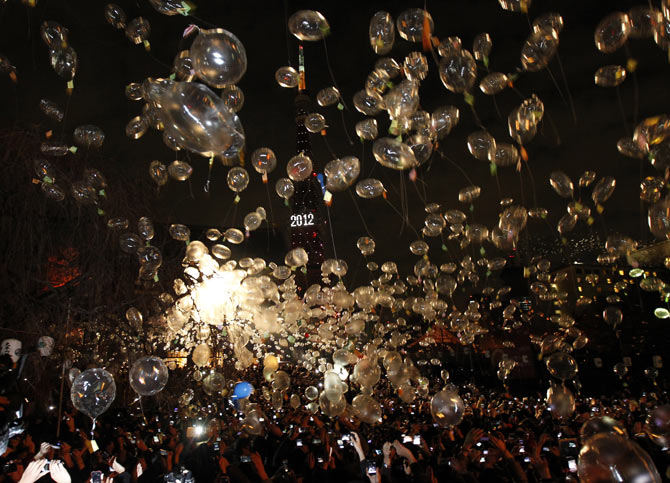 | « Back to article | Print this article |
IN PICS: How the world celebrates New Year
We take a look at the most unusual, extra-ordinary New Year traditions from around the globe.
From wearing red underpants to throwing away furniture and other useless goods out of the window for good luck, here's how people in different countries bring in the New Year. Read on and be amused!
South Africa: Discard the past and useless
In Johanessburg, South Africa on New Year's Eve, people are supposed to throw one old thing from their house out of the window as a mark of bidding goodbye to the old year.
Before midnight, people end up throwing furniture, old appliances and other useless goods out of the window.
Please click NEXT to continue reading...
IN PICS: How the world celebrates New Year
China: Broom out the old, bring in the new
Although the exact date of Chinese New Year keeps changing as per the lunar calendar, the Yuan Tan, as the New Year is traditionally known in the country usually takes place between January 21 and February 20 every year.
Much like the Indian festivals, people in China clean their houses well in advance and when done, put away all the brooms and cleaning equipments till they ring in the New Year.
At midnight, all doors and windows of the houses are left open -- symbolising the old year to step out and allow the New Year to come in.
Some people in China believe that eating cooked chicken with both its head and feet intact would bring them luck and prosperity.
IN PICS: How the world celebrates New Year
Germany: Tell fortune over a candle
In Germany, people traditionally gift each other a four-leaf clover because it is considered good luck.
In parts of the country, a popular tradition also involves a unique form of fortune telling.
The tradition known as Bleigiessen involves people melting a small portion of lead on a silver spoon over a candle.
When the lead melts, it is dipped into cold water and is allowed to solidify.
The shape this lead takes would point to what the fortune lies ahead for the person.
If it resembled a heart or ring, it meant wedding, a ship would mean travel and pig would mean prosperity and abundance of food, so on and so forth.
Phillipines: Go round for luck
When it comes to celebrating the New Year, Filipinos are a superstitious lot.
As part of the celebrations, they take special interest in selecting recipes and cooking food that will bring good luck.
Noodles and eggs are an important part of the menu as they believe eggs signify newness and good things to come.
Unlike most countries, fish and chicken are not served in this country on New Year because the animals in their opinion scrounge for food all year round and eating them on New Year's eve would mean that you would share a similar fate in the forthcoming year.
It is also considered auspicious to feast on twelve different round fruits on this day.
Also, women of the house dress themselves in polka dots because according to them, roundness of any form signifies prosperity.
IN PICS: How the world celebrates New Year
Ecuador: Burn out the old
Besides the usual parties and feasting on the last day of the year, New Year celebrations in Ecuador comprises men dressing like women and erecting life size dummies in ragged clothes outside their homes.
At midnight amid firecrackers, these dummies called Ano Viejo are also lit to celebrate the passing of all things old.
The creative ones make these dummies resembling unpopular political figures, movie characters and animals and find happiness in burning them away.
Estonia: Feast for prosperity and strength
Speaking of unusual New Year traditions, Estonia is not far behind.
Besides visiting each other’s homes and gifting loved ones, an important part of the festivities involve eating an auspicious number of meals.
It is believed that eating seven, nine, or twelve times on New Year's Eve will bring both prosperity and instill strength to face the New Year.
However, while doing so, one should not fall prey to gluttony and should leave behind a small portion for ancestors and old spirits who visit the house on New Year's Eve.
IN PICS: How the world celebrates New Year
Britain: The first male visitor brings luck
In the UK, it is believed that the first male who visits the house after midnight will bring the good luck.
Friends who visit each other’s house post midnight on New Year's carry a gift of good luck for the family.
The gift could be money, bread, coal or something that signifies the fortunes the family hopes to receive in the forthcoming year.
It is considered bad luck if the first visitor turned out be a woman or a red-haired person.
IN PICS: How the world celebrates New Year
Russia: Drink your wish
In Russia, on the last day of the year, people write down a secret wish on a piece of paper.
They then burn this paper and collect the ashes that are emptied into a glass of champagne.
If you drink this before the clock strikes 12.01, your wish is believed to come true.
IN PICS: How the world celebrates New Year
Spain: Green grapes and red underpants for good luck
In Spain, celebrations include a traditional family dinner of shrimp and prawns.
People in the country believe that wearing the colour red on New Year would bring them good luck. That perhaps explains why people in Spain wear red underpants on this day of the year.
On the night of January 31, people gather at the Times Square while the countdown to the New Year is relayed on television.
When the clock on top of the Casa de Correos building in Puerta del Sol Square in Madrid strikes 12, a gong is struck 12 times, once every five seconds.
Each time the gong is struck, people stuff a grape into their mouth, chew it a bit and gulp the next.
It is believed that if you manage to gulp down 12 of them, the year will turn out to be good for you.
The grapes are then washed down with humble helpings of wine and champagne.
IN PICS: How the world celebrates New Year
Japan: Watch out for the firsts!
On New Year, the Japanese wear a costume that represents the forthcoming year's zodiac animal (horse in the case of 2014).
At midnight, Buddhist temples all over Japan ring the bells a total of 108 times at a stretch -- this tradition is believed to help them get rid of the 108 worldly desires and sins leading them to be a responsible and much better person in the new year.
In the new year, people pay attention to every little and mundane event that happens for the first time during the day -- from the rising of the sun, to the first gift they receive to the first person who calls to greet them – as it is indicates how the year will turn out to be for them.
